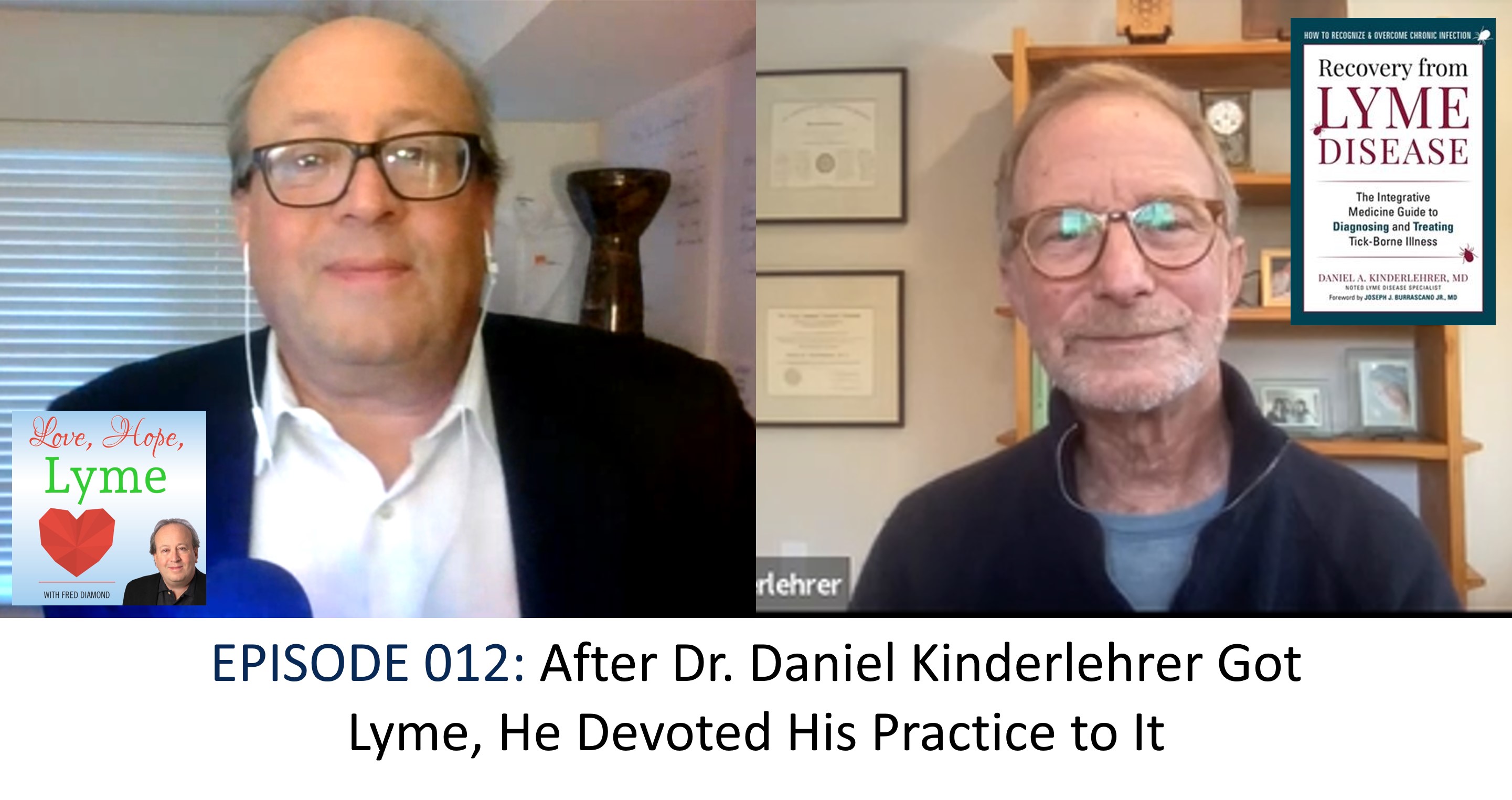PODCAST: After this doctor got Lyme, he devoted his practice to it

By Fred Diamond
I was not aware of the term “Lyme Literate Medical Doctor” (LLMD) when I began research for my book Love, Hope, Lyme: What Family Members, Partners, and Friends Who Love a Chronic Lyme Survivor Need to Know.
However, I quickly met LLMDs who were personally affected by the disease – either they got it or someone in their life did – and they now devote their practice to helping Lyme survivors.
One such physician is Dr. Daniel Kinderlehrer, author of Recovery from Lyme Disease: The Integrative Medicine Guide to Diagnosing and Treating Tick-Borne Illness.
On this week’s Love, Hope, Lyme Podcast, he talks about his journey as an LLMD and shares his thoughts on how family members and friends can best support someone in their life who has Lyme and other tick-borne illnesses. His book is one of the most comprehensive on the topic.
He said, “In 1996, I got incredibly ill from Lyme disease. When I finally recovered to the point of functionality, and I realized how few doctors had any concept of what was happening, I decided to devote my entire practice to treating people who had tick-borne infections and educating the community.”
Before getting Lyme, he practiced holistic, nutritional, alternative, complimentary, and functional medicine for a couple of decades. After becoming knowledgeable about tick-borne illness, he helped create the “Lyme Fundamentals” course, which is taught at the International Lyme and Associated Diseases Society (ILADS) annual conference.
People need to know how real the disease is
“Friends and family need to know that this is a challenging diagnosis, not that it’s that difficult for doctors who are trained, like myself, but rather, if you go to a standard internist or infectious disease doctor, they’re going to probably dismiss you if you say the word Lyme. Most patients have gone through many hurdles, enough to have caused post-traumatic stress disorder (PTSD) from all the wrong diagnoses.”
He cautioned that it will be hard to get validation from most Western mainstream doctors. “The Lyme support community needs to do everything we can to educate ourselves so that we can say, ‘What you’re going through is real, and that’s important. You’re not crazy. You’re not making it up.”
“These infections, in most people, can cause neuropsychiatric problems, the most common being anxiety, depression, and irritability, which can include rage. We must give them a lot of latitude and understand that now they are doing things that they didn’t do in their pre-morbid life. It’s usually inflammation in the brain, and it sends our mood system nuts.”
Dr. Kinderlehrer said that cognitive issues abound, which may bring on dementia in its most severe form.
“Also, it’s never just Lyme disease. People who get chronically ill all have coinfections, other tick-borne infections that are transmitted by these same ticks that are much worse than Lyme. The Lyme itself is not a very bad actor compared to its co-conspirators like Babesia and Bartonella,” he said.
“There are all the downstream consequences of these infections, which is systemic inflammation, which can occur anywhere in the body, but particularly the nervous system and musculoskeletal systems.”
Caregivers should not give up
“What you shouldn’t do is make light of what’s going on. Don’t say the easy aphorisms like, ‘You’re going to be better soon.’ You don’t know if they’re going to be better soon. Ask, ‘How can I help? That’s what you should say to someone with Lyme.”
He advised caregivers to understand that it’s a complicated disease to treat and that they might need to be involved with the treatment and doctor selection.
“The working title for my book was ‘Lyme Disease: It’s Complicated.’ There’s not one fix, and there’s no one size fits all, and it’s never just one thing. We need to ask what do we deal with first? What do we deal with second? How quickly can we start making changes?” he shared.
“It’s different for everybody. Bottom line is that a person with Lyme disease can and must have a very good working relationship with their physician and bring the questions they have to them.”
He also advised that patience is needed. “Most of the patients I see have been sick for years, some of them for decades. All of them have been to multiple doctors, sometimes two, three, maybe a dozen different doctors, and this is particularly galling. Some of them have been to major medical centers that consider themselves the ultimate in western medicine. Those are usually the worst experiences. People come away from them disillusioned and angry.”
“But don’t give up. Believe in yourself. If a doctor says, ‘Well, you got chronic fatigue syndrome, fibromyalgia,’ or, ‘You’re just depressed,’ you must do your research and say, ‘No, that’s just not accurate. I have all these other symptoms. Put them together, will you?”
People need hope
“One of the things I try to do with my patients, particularly the first visit when people come in feeling particularly haggard, is to give them hope and say, ‘I see people like you day in, day out. Almost everyone gets better. Not everyone gets all better, but something like 80% to 90% get 80% to 100% better.”
He lets them know that it takes time, and it takes work, and there are ups and downs. It’s not a linear progression of improvement. “I sometimes describe it as windows starting to clear up and over time there’s more windows and they’re cleaner. These are times when it’s like, “I’m remembering what it feels like to be normal again.”
“This is particularly important for people with neuropsychiatric illness such as depression. I’ve been there. It’s devastating. It’s feeling hopeless and wanting to die. It’s important to help people, to remind them, ‘Remember when life was good? Remember how you enjoyed our trips when the kids were this age and that age? Remember how we used to laugh and so on? That is possible again.”
He also recommended that caregivers be present.
“One of the times when I was at my worst, I can remember my best friend sitting with me. I was so depressed; I was in such agony that I can’t even describe what it was like. He said, “Dan, I don’t know and I don’t understand what you’re going through, but I can be here.”
That’s what we can do. We can be there.
Click here to listen to all episodes of the Love, Hope, Lyme Podcast or on YouTube.
Fred Diamond is based in Fairfax, VA and can be contacted via Facebook. His popular book, “Love, Hope, Lyme: What Family Members, Partners, and Friends Who Love a Chronic Lyme Survivor Need to Know” is available on Amazon. The e-version of the book is always free to Lyme survivors. Send him a private message on Facebook for your copy.





















We invite you to comment on our Facebook page.
Visit LymeDisease.org Facebook Page